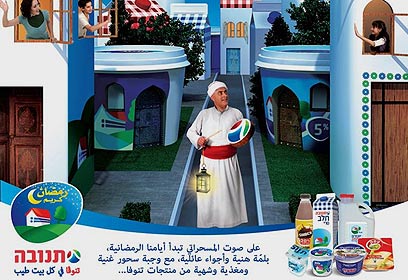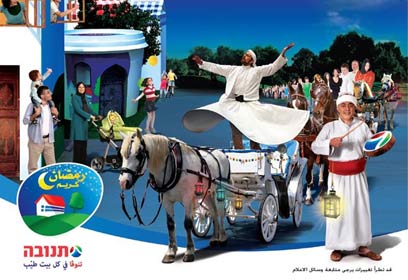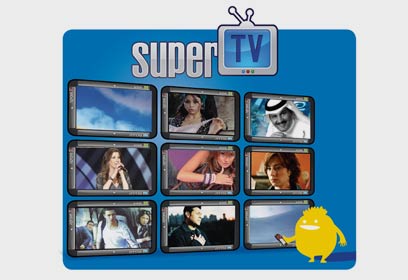
Ramadan a great holiday for advertisers
Israeli companies join in Muslim holiday festivities with ad campaigns, sales, and creative marketing stunts. Tnuva organizes parades, Pelephone holds Facebook competition. But many companies missing out on huge commercial potential of holiday
Ramadan is a big event for advertisers, even if they are not Muslim. At sunset, actors can be found in Arab cities an villages, organizing holiday parades sponsored by Tnuva and distributing kanafe and halva on behalf of Cellcom.
During the beginning of the holiday, young Muslims partook in a soccer tournament sponsored by XL during which they were told that on Ramadan "We don't eat, but we drink XL before the fast and energy levels rise." As temperatures rise, they download free shows for Ramadan on Orange's portal.

Associated Ramadan with dairy. Tnuva (Photo courtesy of Sectors-Albustani)
Their mother comes home from the store with Osem products carrying stickers wishing the family a Happy Ramadan. In the newspaper, recipes from Osem for dishes for the break-fast feast (the iftar) can be seen alongside advertisements for Electra air conditioner units that announce: "Most people eat kadaif after the iftar. Most people choose Electra air conditioning."
The month of Ramadan, during which 80% of Arab Israelis fast from sunrise to sunset, is a consumption smorgasbord. The average Muslim household spends 40% more on food, housewares, electronic products, clothing, and gifts than during typical months. Any marketing executive will tell you that Muslim society in Israel is far less saturated with advertisements than the general population, and therefore represents huge untapped marketing potential.
And yet, future historians researching the advertising and marketing sector in Israel may ask why so few companies in 2010 held ad campaigns or promotions ahead of Ramadan. They will wonder why certain malls at strategic locations in the country, which are filled with enthusiastic Muslim consumers, don't show great interest in the customers fattening their coffers during this month.
These same historians may also take note of the few companies who have taken up the gauntlet in the past five to 10 years and have started making an effort to target Muslim consumers. Though a bit late, it's better late than never, as they say.
Tnuva: Ramadan is for dairy
The food company investing the most in its marketing efforts to the Arab sector is Tnuva, which forecasts a 30% increase in its sales during Ramadan. For its marketing layout, the dairy cooperative targeted the heavy morning meal (suhoor) eaten prior to the fast. The company aims to reinvent Ramadan as the holiday for dairy, just as it reinstated the Jewish holiday of Shavuot as a celebration of dairy.
"Do you think it was easy making Shavuot into the holiday of cheeses?" asked Anat Gross Shon, Tnuva's business and marketing manager. "Tnuva worked very hard to do this. So, here, too, it will take time – especially in a sector characterized by domestic dairies."

Ramadan parades sponsored by Tnuva (photo courtesy of Sectors-Albustani)
Unlike other companies, Tnuva is very active in the Arab sector. Shon noted that for six years, the company has been investing extra marketing efforts in the sector during Ramadan.
"We decided to connect to the morning meal because Ramadan fell in summer this year and 15 hours of fasting is no joke. Therefore, the consumer is not likely to forego any meal, and because it is so hot, will prefer something light, like dairy products. This is an opportunity to connect to a specific consumption moment that is an inextricable part of Ramadan," she explained.
Tnuva decided to back up its efforts with a 360 degree campaign that included special product packaging and a 10-day event in which the company visited each Arab city to lead Ramadan parades with branded horse-drawn carriages. At the end of each parade, the audience was invited to bring three packages of Tnuva products to the activity site. The first to arrive were awarded a home visit of entertainers and riddlers for the family's enjoyment. They would also be given a cooler filled with Tnuva products.

Pelephone's shows for Ramadan (Photo courtesy of Afaq Afikim)
The effort was supported by print ads, billboards, radio spots, internet activity, and 80,000 calendars mailed out to homes marking the fasting times along with tips for an easy fast.
According to Tnuva, its consistent investment in the sector is paying off. According to a TNS telephone poll, 73% of respondents associated Tnuva with the suhoor meal.
"Every sector is important for us and is an integral part of Tnuva," said Shon. "There is no company that has invested like we do in the sectors for so many years. Sectors (Arab, haredi, and Russian consumers) make up 50% of the State of Israel. Therefore, no company can afford not to address the sectors."
Ramadan shows via cellular network
People throughout the Arab world are riveted to no less than 70 television shows special for Ramadan. In Israel, viewers can enjoy the shows via their cellular networks. Orange launched four channels broadcast in Arabic, and also provides the option to download Islamic songs, video clips, and applications.
Cellcom is also broadcasting shows for Ramadan and is distributing halva to its customers. In addition, actors dressed up as characters from a popular show Bab al-Harra, distribute free kanafe and take pictures with people eating the iftar meal in restaurants and coffee shops. The pictures are then uploaded to Cellcom Arabic every evening.
Pelephone launched an American Idol style competition on Facebook. "Everyone can upload a song to Facebook. It gets voted on, and at the end of Ramadan, the winner will record a song with Hussam Habib," said Assaf Ofer, Pelephone's vice president of marketing. He also noted that mobile units are also trolling the cities and villages so that people can record their song on the spot.
'Malls barely throwing them a bone'
Nir Plotkin, owner of Sha'ar Lamigzar, a company that provides services to the business community seeking to engage the Arab sector, noted, "Some 75% of the Arab sector surfs the internet. Young people are on Facebook en masse. It is a way of circumventing dad. The girls dress nicely, like brand names, and the cellular market works quite nicely."
"Commercial companies must take note of this as an indicator of progress within the Arab sector in general. I recommend that they relearn the Arab sector. Be there. Budgets for the sector a miniscule, and this is a shame. We tend to wake up too late, and this is precisely the season that should not be missed in terms of marketing."
According to Plotkin, malls have not yet grown wise enough to take advantage of the momentum. "During Ramadan, fasters inundate what is known as the 'sector vicinity' – shopping centers nearby the sector's population centers."
"G Center in Kfar Saba, for instance, is packed with Arabs from the Triangle. For them, this is an experience a little bit like being abroad. The shopping craze continues even for 40 days after Eid el-Fitr (the end of Ramadan) until Eid al-Adha. But the malls' management companies barely throw a bone at advertising to the Arab sector. Because Eid al-Fitr is on Rosh Hashana this year, they benefit from the sales for the Jews," explained Plotkin.
- Follow Ynetnews on Facebook










